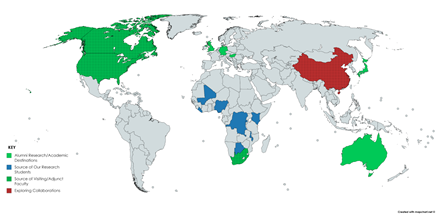The University of Nairobi’s Centre for Biotechnology and Bioinformatics (CEBIB), based at the College of Biological and Physical Sciences (CBPS), is a premier Centre for research and training in Biotechnology and Bioinformatics in Kenya and the East and Central Africa region – founded in 2005; and has had two Directors (i) The late Prof. James O. Ochanda (2005-2014), and (ii) Dr. George O. Obiero (2014-Present). CEBIB offers postgraduate research programmes at Masters and PhD levels in Biotechnology and Bioinformatics. In addition, the Centre supports lab-based training of both undergraduates and postgraduates from other units within the university. The research focus at CEBIB can be either in the “wet-lab” or “in silico” based on the researcher's interests. The Centre conducts state of the art multi-disciplinary research. CEBIB enjoys the benefit of world-class faculty from multiple disciples from within the university, in partner universities and among industry collaborators. Among the top facilities in the region is a fully internationally accredited aflatoxin testing laboratory.
Some of the key research collaborators are the Ministry of Health, Kenya Bureau of Standards, Kenya Medical Research Institute, USAMRU-Walter Reed Research Unit- Kenya, ICIPE, ILRI, Washington State University, University of Manitoba, KALRO, University of Colorado, Denver Foundation, Biozeq-Kenya Limited amongst others. CEBIB has a reputation for its high-quality research often published in reputable journals for example Nature and Science amongst others. Students and Faculty at CEBIB continue to receive regional and international research awards in recognition of their exceptional research outputs. This is in addition to the increasing number of globally competitive research grants received at CEBIB to support continuing top-class research.
Collaborative research networks at CEBIB have a wide international reach with notable research performed jointly between faculty and students from Kenya and other sub-Saharan Africa countries including Mali, Liberia, Nigeria, Democratic Republic of Congo, Rwanda, Botswana, and Malawi (Figure 1).
A recent alumni tracking survey showed that various CEBIB alumni received fully-funded scholarships to further their research studies in international universities or have taken up leadership roles in industry and academia – attesting to the world-class standards of the scholars graduating from CEBIB, refer to (Figure 1). Furthermore, the Centre faculty progressively seek collaborative engagements with partners in academia and industry.

Figure 1: A world map illustrating CEBIB students’ enrolment and research destinations
